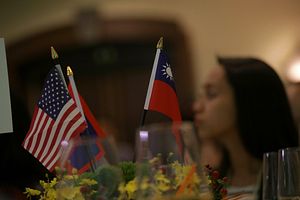In part of its long-term effort to delegitimize Taiwan as an independent state, China has pushed states to switch their recognition of China from the Republic of China (ROC or Taiwan) to the People’s Republic of China (PRC or China). Last week, both the Solomon Islands and Kiribati switched recognition, leaving only 15 countries left that still recognize the government in Taiwan as representing China.
The United States was swift to respond, not to China, but to the Solomon Islands. Vice President Mike Pence immediately cancelled an upcoming meeting with Solomon Islands Prime Minister Manasseh Sogavare. Senator Marco Rubio has threatened to explore ways of cutting ties with the islands including ending financial assistance and restricting access to U.S. financing.
The United States has the room to threaten severing ties with the Solomon Islands as the small island nation offers relatively little to U.S. interests in the region. The optics, however, are poor considering the great importance the islands played for the United States in defeating the Japanese in World War II. The move would also be inconsistent with the United States’ own policy, which recognizes the PRC as China and the ROC in Taiwan as a renegade province. Most importantly, the threats signal a growing contempt for U.S. allies and client states if their actions do not contribute directly or materially to American interests in the Pacific. This sacrifices a greater Pacific strategy to keep China in check and defend Taiwan.
The threats to the Solomon Islands follow a pattern begun in 2017 when the United States pulled out of the Trans Pacific Partnership. Citing a detrimental effect on jobs in the United States, U.S. President Donald Trump backed out of the partnership almost as soon as his presidency began. But the core of the economic partnership had been to unite Pacific economies in order to provide avenues for concerted pushback against Chinese economic and financial provocations. Instead, the United States has opted to pursue trade treaties bilaterally, beginning with Japan and South Korea. U.S. tactics in these negotiations, including threats of withholding vital security aid and reducing military presence, has led to tensions between the two countries and the United States. Additionally, a lack of leadership in coordinating a singular policy in regard to North Korea, has led not just to tensions between South Korea, Japan and the United States but also to the breakup of a vital intelligence sharing agreement between South Korea and Japan.
This strategy of bilateral bullying isn’t new in the region either. When Seoul opted to deploy the U.S.-supplied Terminal High Altitude Area Defense System (THAAD), China — in protest — blocked South Korean media in China and started an anti-Korean media blitz in the global press. China threatened the Philippines over its legal claims to the Spratlys, and threatened Australia over its support for the Permanent Court of Arbitration’s ruling on territorial claims in the South China Sea.
But for all the bluster, these tactics didn’t work for China. In fact, due to China’s belligerence, the United States was able to deepen military ties with both Vietnam and Indonesia furthering a regional security balance in Washington’s favor. It was over China’s aggressiveness that the Obama administration had been so successful in convincing 11 other countries to join the United States’ TPP. Should the United States continue to adopt a strategy of threats and interference with its allies, it won’t be able to blunt the teeth of China’s threats or reduce the utility of their economic inducements.
If the United States wants to defend Taiwan, it might consider avenues that refrain from signaling disregard for a delicate security architecture in the Pacific built carefully over decades. Admittedly, who recognizes Taiwan as the rightful representative of China doesn’t contribute more or less to Taiwan’s security. The United States and other nations have found creative ways to continue to supporting Taiwan’s de facto independence from China that do not involve recognition. But the more the Trump administration pulls the threads of extended security in the Pacific apart, the more openings China could find to pull allies away in more meaningful ways and over time removing support for the defense of an independent Taiwan.
Jonathan Stutte is a staff writer for Charged Affairs, the Young Professionals in Foreign Policy’s foreign policy journal.

































